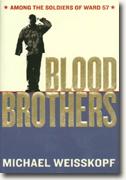Blood Brothers
Michael Weisskopf
book reviews:
· general fiction
· chick lit/romance
· sci-fi/fantasy
· graphic novels
· nonfiction
· audio books
· author interviews
· children's books @
curledupkids.com
· DVD reviews @
curledupdvd.com
newsletter
win books
buy online
links
home
for authors
& publishers
for reviewers

 |
Blood Brothers: Among the Soldiers of Ward 57 Michael Weisskopf Henry Holt Hardcover 320 pages October 2006 |
|
The best introduction to this account is tucked away in the back of the book under Notes: “This exploration of human loss and redemption is based principally on interviews with three men who experienced both: Peter Damon, Luis Rodriguez, and Bobby Issacs. I spent dozens of hours speaking to them in the 18 months after my arrival at Walter Reed.” Michael Weisskopf lists himself as the books “fourth subject.” The common denominator and bond between these men are a loss of limb in Iraq and their hard journeys through agonizing pain and rehabilitation to a redefinition of self and their lives.
Through Weisskopf, Damon, Rodriguez, and Issacs share their private pain, reminding us that the cost of war is not measured in dollars and cents. Their families and caretakers, the doctors, nurses, and rehabilitation specialists, also find a voice in this book. Weisskopf pulls no punches when it comes to the challenges soldiers face missing one or more limbs. Simple tasks such as eating and bathroom hygiene are obstacles to be overcome. Like Weisskopf before he lost a hand, I had never considered the mechanics of how a hand works, never thought about the hard work and training it takes for an amputee to use a prosthetic hand or leg. It is important to look straight on at the cost of war and the courage the wounded draw on to get through just one more hour, to pound out a life different from anything they could have imagined. It is an honor to be allowed to see into the lives of the hundreds of people who shared part of their story in this book. I was moved to tears many times but never to pity and always left with respect and admiration for the men and women whose lives were touched by the war in Iraq and Ward 57. Originally published on Curled Up With A Good Book at www.curledup.com. © Pamela Crossland, 2007 |
|
|
|
 Click here to learn more about this month's sponsor! |
|
| fiction · sf/f · comic books · nonfiction · audio newsletter · free book contest · buy books online review index · links · · authors & publishers reviewers |
|
| site by ELBO Computing Resources, Inc. | |
 Weisskopf, senior correspondent for Time magazine, worked as an embedded reporter working alongside soldiers from the U.S Army’s First Armored Division. His life changed forever when a dark object landed in the Humvee carrying through the streets of Baghdad. He reached down and picked up the object (a grenade) and threw it out of the Humvee, saving the lives of the men in the vehicle through war honed instinct and losing his right hand. A special waiver allowed him to go to Ward 57, the first reporter wounded in a war given the privilege of treatment and recovery there.
Weisskopf, senior correspondent for Time magazine, worked as an embedded reporter working alongside soldiers from the U.S Army’s First Armored Division. His life changed forever when a dark object landed in the Humvee carrying through the streets of Baghdad. He reached down and picked up the object (a grenade) and threw it out of the Humvee, saving the lives of the men in the vehicle through war honed instinct and losing his right hand. A special waiver allowed him to go to Ward 57, the first reporter wounded in a war given the privilege of treatment and recovery there.